"Lost" for Seventy-two Hours in Cuba, the Invisible Island
By Gilya G. Schmidt
The airplane doors opened and the many Cuban-Americans who had shared my short forty-minute flight from Miami to La Habana spilled out onto the tarmac. "Gilya Schmidt," a male voice called. I didn't expect to be picked up, but what else could it be? "How nice of you to pick me up," I said to the official-looking gentleman in a blue suit. All state employees wear blue suits, I learned, whether airport official or taxi driver. "You are not being picked up – exactly," he responded. "Oh"? He hustled me out of the line which was moving towards Passport Control and towards an anxious-looking woman, also dressed in blue, who asked to see my papers. Then she handed me a voucher for the hotel at which I was to stay. "Your voucher, your voucher," she intoned. I had no idea that I needed a voucher, nor did I realize until I checked out four days later that I had prepaid my hotel. Hence the voucher. I did realize, however, that it was not for the hotel for which I had a written reservation, but a lesser version, not on the beach, but across the street from the other hotel. We all know from Myrtle Beach and other places that the across-the-street accommodations are much less desirable. This was true here as well. I tried to argue with her, showing her my reservation, but to no avail. Our conversation was finished.
I got back in line for Passport Control, which was not too arduous. They checked my documents, and then I was on the other side. I looked for my baggage, again standing in line, and for a moment I forgot that I had not yet gone through Customs. A youngish man walked towards me and said something in Spanish that I did not understand. I was under the impression that he was hustling me – taxi, money, sights, so I turned away abruptly, towards two female Customs agents. They just looked at me, motionless. Well, no help coming from that sector. But the man pursued me. Now I became alarmed. "Your passport, please," he said in Spanish. I responded in English, "Why, I just showed it to the Passport official." He pointed to his vest, which said Aduana, and opened his vest to show me an even more official looking badge on his shirt. And then it dawned on me. I was being singled out for inspection. Of course, I shouldn't have been surprised. After all, what was a gringo like myself, a U.S. citizen, doing in Cuba anyway?
The Customs official perused my passport at great length, filled out a form, he even wrote on it that I was wearing a University of Tennessee sweatshirt and a cap with our trademark T. He kept asking another official, a woman, to join him so he could consult with her. I told her that I had not yet gotten my luggage. "Go, find it," she said. How was I going to find my bag, nervous as I was by now, with every single bag wrapped in the same sky-blue plastic wrap so the contents wouldn't walk away? Miraculously, the bag was quite near me, and I retrieved it in minutes. By now the Aduana had completed his inspection of my documents, and asked many questions. "What is your occupation?" "I am a professor," I responded. A professor of what? And then it hit me that I was on a slippery slope again. "Religion," I responded in Spanish. He winced. That's what I was afraid of, so I quickly added, "Historia." "Si," he nodded, and I presume that's what he wrote down. I made another bad move by giving him my business card which, of course, has religion written all over it. He looked at it for a while and then gave it back to me without comment. I quickly put it back in my bag. Better not aggravate the situation.
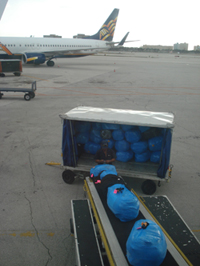 With all the traveling I do, much of it international, I had never been scrutinized this closely before, not even by the Israelis, who, in contrast to the Cubans, usually want to know all about my religion. He motioned me with my suitcase to an empty table in the far corner of the hall, and asked a colleague for a knife. After looking the blade up and down, he began to slice away at the plastic wrapping. I unlocked my suitcase, and he began to take out every single item in it. He couldn't understand why I had bubble-wrap envelopes. Actually, neither could I. I just knew that the travel agent told me to take absolutely everything along that I might need because I wouldn't be able to buy it there. Fortunately, since one of our giant chains caters to our south-of-the-border friends, many of the items I had with me – needle and thread, pens, paper clips, pins – showed the contents in Spanish. That made things easier. Now we got to my book manuscript, boxed up, which I was taking along as a present for the 91-year-old man who was my reason for traveling to Cuba. Yes, it was in English – in the meantime the agent had joked with me that I spoke pocito espanol and he spoke pocito ingles. Verdad. He again consulted with his colleague, who asked me what was the point of bringing this writing to Cuba. I explained about the old man and they decided to move on. Now I also had the family documents, only recently released by the German archives, concerning family matters of interest to my contact. The Aduana noted that they were in German. I said, yes, all my sources are in German. After all, I am a professor of history, they are historical. "Viejo," I kept saying, not sure that was the right word, and I pointed to the date of 1906. Mercifully, the inquisition of my suitcase came to an end. To my displeasure, he next attacked the plastic JPS (Jewish Publication Society) bag of Jewish newspapers, Jerusalem Report, Moment magazine, Forward, and New York Times as well as UT's Beacon. The Cuban government isvery strict about pornographic materials,
With all the traveling I do, much of it international, I had never been scrutinized this closely before, not even by the Israelis, who, in contrast to the Cubans, usually want to know all about my religion. He motioned me with my suitcase to an empty table in the far corner of the hall, and asked a colleague for a knife. After looking the blade up and down, he began to slice away at the plastic wrapping. I unlocked my suitcase, and he began to take out every single item in it. He couldn't understand why I had bubble-wrap envelopes. Actually, neither could I. I just knew that the travel agent told me to take absolutely everything along that I might need because I wouldn't be able to buy it there. Fortunately, since one of our giant chains caters to our south-of-the-border friends, many of the items I had with me – needle and thread, pens, paper clips, pins – showed the contents in Spanish. That made things easier. Now we got to my book manuscript, boxed up, which I was taking along as a present for the 91-year-old man who was my reason for traveling to Cuba. Yes, it was in English – in the meantime the agent had joked with me that I spoke pocito espanol and he spoke pocito ingles. Verdad. He again consulted with his colleague, who asked me what was the point of bringing this writing to Cuba. I explained about the old man and they decided to move on. Now I also had the family documents, only recently released by the German archives, concerning family matters of interest to my contact. The Aduana noted that they were in German. I said, yes, all my sources are in German. After all, I am a professor of history, they are historical. "Viejo," I kept saying, not sure that was the right word, and I pointed to the date of 1906. Mercifully, the inquisition of my suitcase came to an end. To my displeasure, he next attacked the plastic JPS (Jewish Publication Society) bag of Jewish newspapers, Jerusalem Report, Moment magazine, Forward, and New York Times as well as UT's Beacon. The Cuban government isvery strict about pornographic materials, 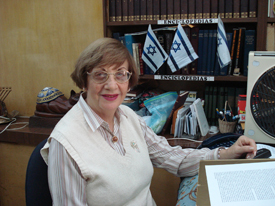 but I couldn't be faulted on that basis. Nor did I have any materials that defamed the Cuban government. However, since the customs official had gotten skittish when I mentioned religion, I was wondering what reaction my Jewish publications would elicit from him. After all, they had plenty to do with religion. I could do nothing but stand there and wait until he went, ever so slowly, through every single page of every single newspaper I had. Pointing occasionally at this or that, among them also a bikini-clad female figure, he made two piles, and I was wondering what his criteria were. But when he had completed his perusal, he calmly took each pile and put it back into my blue JPS plastic bag, which matched the wrapping on the suitcases.
but I couldn't be faulted on that basis. Nor did I have any materials that defamed the Cuban government. However, since the customs official had gotten skittish when I mentioned religion, I was wondering what reaction my Jewish publications would elicit from him. After all, they had plenty to do with religion. I could do nothing but stand there and wait until he went, ever so slowly, through every single page of every single newspaper I had. Pointing occasionally at this or that, among them also a bikini-clad female figure, he made two piles, and I was wondering what his criteria were. But when he had completed his perusal, he calmly took each pile and put it back into my blue JPS plastic bag, which matched the wrapping on the suitcases.
What was left was my computer bag, minus computer. I had only my tape recorder, tapes, batteries, camera and personal effects in it, and he gave it barely a glance. I was almost disappointed. Then he told me to wait and disappeared for quite some time. The hall was beginning to empty, and two hours after the ordeal started I was free to go. Welcome to Cuba! He smiled and mumbled something that I took to be an apology, and then the exit crew waved me through, only to have me come to a dead stop, because I was inside an enclosure like a cage of very strong mesh wire fence, with what seemed to be hundreds of people pressed against the fence, waiting for relatives and friends. Where was the exit? At that moment, a security guard appeared and unlocked the gate for me, and I was engulfed in another sea of humanity. By now it was 8 PM and pitch dark. There were no street lights to speak of, and I had a hard time orienting myself. I needed to find the Cambio, or currency exchange, but where would it be? 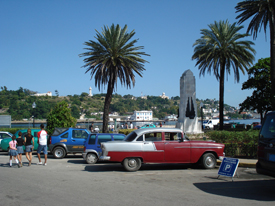 As I was about to cross a street filled with old Pontiacs and Chevys – those were the taxis – and dragged my suitcase down a flight of stairs, someone called my name. Who on earth knew me here? It was a student from Florida International, who had stood in a very long, six-hour line, with me and numerous other Cuban-American families in Miami, while we were waiting to have our documents checked. I was so happy to see her. I asked if she knew where the Cambio was. She pointed behind me, to the sea of humanity, and there it was, squeezed into a corner, fortunately on the outside of the wire enclosure. I thanked her and wished her a nice time with her family, and then I braved the crowd and the street once more to exchange my money. Since I had brought Euros, the process was painless and quick (although buying Euros at the price of 1.57 was not!) I approached another official-looking man and asked him where to find a taxi. He pointed behind me, and there was one of the burly blue-suited state officials to whom I now had to explain where I wanted to go. We were standing in the middle of the street, haggling over the price. He wanted forty CUC, or Convertible Pesos, and I offered twenty. But he wouldn't budge. I was very tired and wanted to get my hotel, and when he said that it was 20 km, I had to agree that 2 CUCs a kilometer, about two dollars, was worth the price of a bed. So I gave in.
As I was about to cross a street filled with old Pontiacs and Chevys – those were the taxis – and dragged my suitcase down a flight of stairs, someone called my name. Who on earth knew me here? It was a student from Florida International, who had stood in a very long, six-hour line, with me and numerous other Cuban-American families in Miami, while we were waiting to have our documents checked. I was so happy to see her. I asked if she knew where the Cambio was. She pointed behind me, to the sea of humanity, and there it was, squeezed into a corner, fortunately on the outside of the wire enclosure. I thanked her and wished her a nice time with her family, and then I braved the crowd and the street once more to exchange my money. Since I had brought Euros, the process was painless and quick (although buying Euros at the price of 1.57 was not!) I approached another official-looking man and asked him where to find a taxi. He pointed behind me, and there was one of the burly blue-suited state officials to whom I now had to explain where I wanted to go. We were standing in the middle of the street, haggling over the price. He wanted forty CUC, or Convertible Pesos, and I offered twenty. But he wouldn't budge. I was very tired and wanted to get my hotel, and when he said that it was 20 km, I had to agree that 2 CUCs a kilometer, about two dollars, was worth the price of a bed. So I gave in.
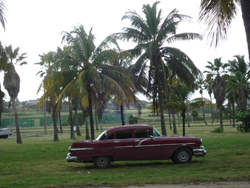 We set out, and except for a number of other vintage automobiles, it quickly became desolate. We left the city, and continued on a very wide, totally dark, country road, with no dividers, and cars making their way over the potholed dirt surface with some care. I was just a bit uncomfortable, especially since there were stretches when we didn't even see one other car. The ride was about forty minutes, with many turns, but he got me to the hotel. I was excited. It looked fancy, and I was sure that I would find a comfortable bed. I paid him and he left. The porter took my luggage up the steps and into the hotel. The lady at the check-in desk looked at me, I handed her my voucher and my health insurance policy, and she looked back and forth for a bit before she said, "You are in the wrong hotel." I said, "Oh no, I have a reservation." But she shook her head adamantly, and directed the porter to take me across the street. What a loss in prestige! While I have only good things to say about the staff in the "hotel" and all the people I interacted with in Cuba, I had landed in first-rate people's accommodations. This was not a place to impress tourists. The apartment was sparse, with all the necessities, even English CNN for a few hours a day, but no amenities. I looked worriedly at the windows with wide wooden slats, and asked the porter, "Seguro"? He nodded. I slept with the lights on, remembering horror stories about southern Florida when one turns off the lights. But I shouldn't have worried, I never saw any creature bigger than an ant, with one exception – a sweet salamander that got lost inside the ground floor apartment. The next morning in daylight, I was able to see how poorly maintained everything was. My building and the next one over were painted on the outside. For the third one the money had obviously run out, and buildings four and five were mere shells, not inhabitable. This was a sight I became accustomed to no matter where I was in La Habana.
We set out, and except for a number of other vintage automobiles, it quickly became desolate. We left the city, and continued on a very wide, totally dark, country road, with no dividers, and cars making their way over the potholed dirt surface with some care. I was just a bit uncomfortable, especially since there were stretches when we didn't even see one other car. The ride was about forty minutes, with many turns, but he got me to the hotel. I was excited. It looked fancy, and I was sure that I would find a comfortable bed. I paid him and he left. The porter took my luggage up the steps and into the hotel. The lady at the check-in desk looked at me, I handed her my voucher and my health insurance policy, and she looked back and forth for a bit before she said, "You are in the wrong hotel." I said, "Oh no, I have a reservation." But she shook her head adamantly, and directed the porter to take me across the street. What a loss in prestige! While I have only good things to say about the staff in the "hotel" and all the people I interacted with in Cuba, I had landed in first-rate people's accommodations. This was not a place to impress tourists. The apartment was sparse, with all the necessities, even English CNN for a few hours a day, but no amenities. I looked worriedly at the windows with wide wooden slats, and asked the porter, "Seguro"? He nodded. I slept with the lights on, remembering horror stories about southern Florida when one turns off the lights. But I shouldn't have worried, I never saw any creature bigger than an ant, with one exception – a sweet salamander that got lost inside the ground floor apartment. The next morning in daylight, I was able to see how poorly maintained everything was. My building and the next one over were painted on the outside. For the third one the money had obviously run out, and buildings four and five were mere shells, not inhabitable. This was a sight I became accustomed to no matter where I was in La Habana.
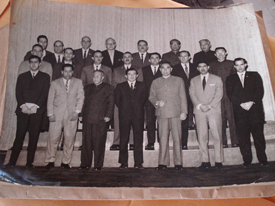 So why put myself through these extreme travel conditions? It all began while I was in Germany last spring doing research for a book on rural German Jews. One of the reporters of the statewide newspaper, Stuttgarter Zeitung, interviewed me about my project and wrote a very informative article for the regional section. As a result of this article, I received a phone call from a gentleman in Stuttgart who told me that one of the names in the heading had caught his eye. He said that he had visited Cuba annually for the past fifteen years and every time visited the man I was searching for, the only living heir of this family about whom I am writing. After seeing the article, he had even called his friend in Havana to pave the way for my phone call to him. I thanked him profusely and took him up on the offer to call Mr. O. We had a two-hour conversation on the telephone, his German was as good as anyone's. One would never have known that he had lived in Cuba since 1940, not speaking any German. He had married a Cuban woman. I asked if he would mind if I came to Cuba to talk with him. He told me that would be fine, if he was still around. At 91 he didn't think he could make long-range plans. I had to agree. When I came back to the U.S., I inquired into the possibility of traveling to Cuba, and was pointed to a travel agency that specializes in travel to Cuba for U.S. citizens. This is how my trip to Cuba in December of 2007 came about. There were few signs of Christmas under the brilliant azure skies and the bleach white beaches with palm trees that carried the weight of formidable coconuts gently swaying in the breeze. In one place a man was "peeling" a coconut with his machete. I was wondering how he would make a living if he missed.
So why put myself through these extreme travel conditions? It all began while I was in Germany last spring doing research for a book on rural German Jews. One of the reporters of the statewide newspaper, Stuttgarter Zeitung, interviewed me about my project and wrote a very informative article for the regional section. As a result of this article, I received a phone call from a gentleman in Stuttgart who told me that one of the names in the heading had caught his eye. He said that he had visited Cuba annually for the past fifteen years and every time visited the man I was searching for, the only living heir of this family about whom I am writing. After seeing the article, he had even called his friend in Havana to pave the way for my phone call to him. I thanked him profusely and took him up on the offer to call Mr. O. We had a two-hour conversation on the telephone, his German was as good as anyone's. One would never have known that he had lived in Cuba since 1940, not speaking any German. He had married a Cuban woman. I asked if he would mind if I came to Cuba to talk with him. He told me that would be fine, if he was still around. At 91 he didn't think he could make long-range plans. I had to agree. When I came back to the U.S., I inquired into the possibility of traveling to Cuba, and was pointed to a travel agency that specializes in travel to Cuba for U.S. citizens. This is how my trip to Cuba in December of 2007 came about. There were few signs of Christmas under the brilliant azure skies and the bleach white beaches with palm trees that carried the weight of formidable coconuts gently swaying in the breeze. In one place a man was "peeling" a coconut with his machete. I was wondering how he would make a living if he missed.
Cuba once was exactly what it is today, an extension of the Americas. But the focus has shifted. The United States more than once offered between $100 and 300 million dollars to buy the island. The respective "owners" always declined. In the 1930s Cuba became a mecca for gamblers and other shady American characters, including Al Capone. Fidel Castro started out as a hero, for Cubans he apparently still is, but when he did not dance to the tune of American politicians, the honeymoon ended. Today Cuba's alliance is with South America, especially Venezuela and President Hugo Chavez, who visited Cuba while I was there. Cuba's colonial past is much in evidence, unfortunately only as a jaded afterglow of peeling paint and empty facades. The fall of the Soviet Union and the trade embargo of the United States are at the root of the great poverty in Cuba, a poverty that is shouldered by the entire nation together. Nevertheless, Cubans nostalgically speak of the great United States, witnesses to a desire for change between our two countries.
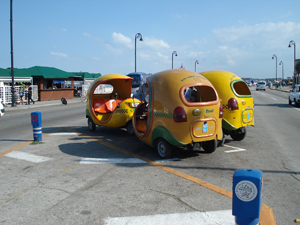 Transportation in Cuba is at your own risk. Most of the cars, with the exception of those that belong to rental agencies, are ancient. They are vintage vehicles of the antique kind, often held together by – glue?? – and belching thick black smoke. They are supplemented by horse carriages, bici-taxis, and the most adorable yellow coco-taxis. Money, too, knows to make a distinction between foreigners and the poor locals. Along the road one sees large crowds of people holding up bills to hail any transportation whatsoever. I pointed out to my taxi driver that he could make a lot of money if he picked up a whole car full every time he had a tourist passenger. "No, no," he retorted. Their money isn't any good." It was the local Cuban currency, the peso, worth only about a twenty-fifth of the CUC with which tourists are paying. It seems for Cubans there is no way to climb out of the hole. Even if they had money to pay for goods, there are no goods to buy. Since merchandise is rationed, the shelves are often bare. This situation made me very sad.
Transportation in Cuba is at your own risk. Most of the cars, with the exception of those that belong to rental agencies, are ancient. They are vintage vehicles of the antique kind, often held together by – glue?? – and belching thick black smoke. They are supplemented by horse carriages, bici-taxis, and the most adorable yellow coco-taxis. Money, too, knows to make a distinction between foreigners and the poor locals. Along the road one sees large crowds of people holding up bills to hail any transportation whatsoever. I pointed out to my taxi driver that he could make a lot of money if he picked up a whole car full every time he had a tourist passenger. "No, no," he retorted. Their money isn't any good." It was the local Cuban currency, the peso, worth only about a twenty-fifth of the CUC with which tourists are paying. It seems for Cubans there is no way to climb out of the hole. Even if they had money to pay for goods, there are no goods to buy. Since merchandise is rationed, the shelves are often bare. This situation made me very sad.
Was the trip worth the effort and the hassle? Yes, anytime one can broaden one's horizons, in whatever way, it is worth the effort. I met an inquisitive and clear-headed 91-year-old man, a realist who borders on being a cynicist. Every day he climbs up and down the seventeen steps of his second-floor backroom apartment in government housing to fetch a loaf of bread before the shelves are bare again. I met his daughter and twelve-year old granddaughter, with whom I could not communicate because they only speak Spanish, and learned that his son and family had made it to the United States, fortunately not as boat people, which still happens every day. I came back with further confirmation of information other old-timers from southern Germany have shared with me about Jewish life in rural areas, the nature of the Goeppingen Jewish community, their primary identity as Swabians and only secondly as Jews, yet their attachment to traditional Jewish delicacies such as berches (challah bread). Having never seen pictures of his parents, and of him only as a ten-year old boy, repeated pleading produced several pictures of the immediate family, including his beautiful late wife.
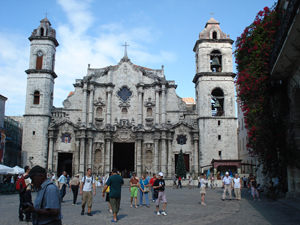 Not least, I learned a lot about Cuba -- the great beauty of the land, equaled only by the extreme poverty of most of the population, the rationing of food, the ancient cars and resultant pollution, the heavy police presence, and the kindness of the Cuban people, who will bend over backwards to make a stranger welcome. Cuban solicitiousness is matched only by the irresistible flan and the tasty mojitos – for tourists only. La Habana Vieja, Old Havana, bears witness to an era when this part of town must have been a tourist haven, with a lovely Cathedral and Moorish buildings surrounding the square, narrow streets with a few well-painted buildings for the tourists, a formidable fort with cannons at attention, and several interesting museums and stores displaying local handicrafts. There are New Orleans-style street musicians and colorful flower girls.
Not least, I learned a lot about Cuba -- the great beauty of the land, equaled only by the extreme poverty of most of the population, the rationing of food, the ancient cars and resultant pollution, the heavy police presence, and the kindness of the Cuban people, who will bend over backwards to make a stranger welcome. Cuban solicitiousness is matched only by the irresistible flan and the tasty mojitos – for tourists only. La Habana Vieja, Old Havana, bears witness to an era when this part of town must have been a tourist haven, with a lovely Cathedral and Moorish buildings surrounding the square, narrow streets with a few well-painted buildings for the tourists, a formidable fort with cannons at attention, and several interesting museums and stores displaying local handicrafts. There are New Orleans-style street musicians and colorful flower girls.
Americans are not allowed to support the Cuban economy by buying souvenirs to bring back. In Cuba I saw many similarities to China, including CCTV, the cultural TV channel that I watched in China last summer complete with the Chinese programming.
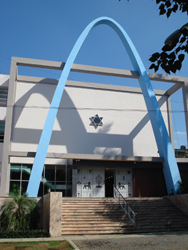 Oh, and yes, La Habana has three synagogues, Sephardic, Orthodox, and Conservative. They have websites with all the pertinent information. The Conservative shul, successor to the original Orthodox synagogue which was built in 1906, is a beautiful and stately edifice dating from 1953. The building is much too big for today's congregation of about 900, most of whom are converts to Judaism. The congregation is led by a sweet and committed female Presidenta of Russian Jewish descent. We met in the air-conditioned library which looked very familiar with its series of Encyclopedia Judaica and other Judaica books on the shelves and something of a gift shop. They also have a South American cantor, but no rabbi. While I was visiting at the shul, a Canadian woman came in with her family. Canada did not sever relations with Cuba when the U.S. did and have provided a lifeline to the Cuban people over the years. Their synagogue had sent the mazzah for Pesach 5767. "Enough to last us all year," la Presidenta quipped. Although the congregation is in need materially, their friends provide, and their spirit continues without flagging.
Oh, and yes, La Habana has three synagogues, Sephardic, Orthodox, and Conservative. They have websites with all the pertinent information. The Conservative shul, successor to the original Orthodox synagogue which was built in 1906, is a beautiful and stately edifice dating from 1953. The building is much too big for today's congregation of about 900, most of whom are converts to Judaism. The congregation is led by a sweet and committed female Presidenta of Russian Jewish descent. We met in the air-conditioned library which looked very familiar with its series of Encyclopedia Judaica and other Judaica books on the shelves and something of a gift shop. They also have a South American cantor, but no rabbi. While I was visiting at the shul, a Canadian woman came in with her family. Canada did not sever relations with Cuba when the U.S. did and have provided a lifeline to the Cuban people over the years. Their synagogue had sent the mazzah for Pesach 5767. "Enough to last us all year," la Presidenta quipped. Although the congregation is in need materially, their friends provide, and their spirit continues without flagging.
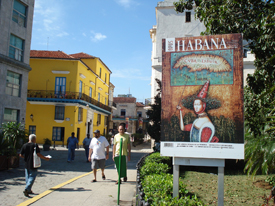 On the way back to my hotel, after passing the impressive Hotel Nacional, we drove along the waterfront on the Malecon towards the Moro lighthouse and past the famous Havana skyline. At first it looked very inviting, but as we got closer it had the appearance of a ghost town -- some buildings are only empty facades, decaying from the salt of the sea and neglect. The windows had no panes and the structures were not inhabited. Although it was a magnificent and summery day, I felt chilled.
On the way back to my hotel, after passing the impressive Hotel Nacional, we drove along the waterfront on the Malecon towards the Moro lighthouse and past the famous Havana skyline. At first it looked very inviting, but as we got closer it had the appearance of a ghost town -- some buildings are only empty facades, decaying from the salt of the sea and neglect. The windows had no panes and the structures were not inhabited. Although it was a magnificent and summery day, I felt chilled.
In many ways, Cuba is a final frontier -- an island and a population who have been both a haven to a multitude of persecuted individuals for five centuries and who have been shamelessly exploited by foreigners invading their soil since the time of Columbus. Since establishing diplomatic relations with China in the eighties, the U.S. is making such progress in our relations with that country, maybe we could also reach out to our neighbors 90 miles from Miami. And I can think of many a collector who would love to buy one of those classic automobiles!
In preparing for this trip, I tried to be ready for all eventualities, but I forgot one factor – the mosquitoes. They are almost as numerous as the Cuban security guards and almost as relentless as the Cuban Customs officials, and I was equally unprepared for them.